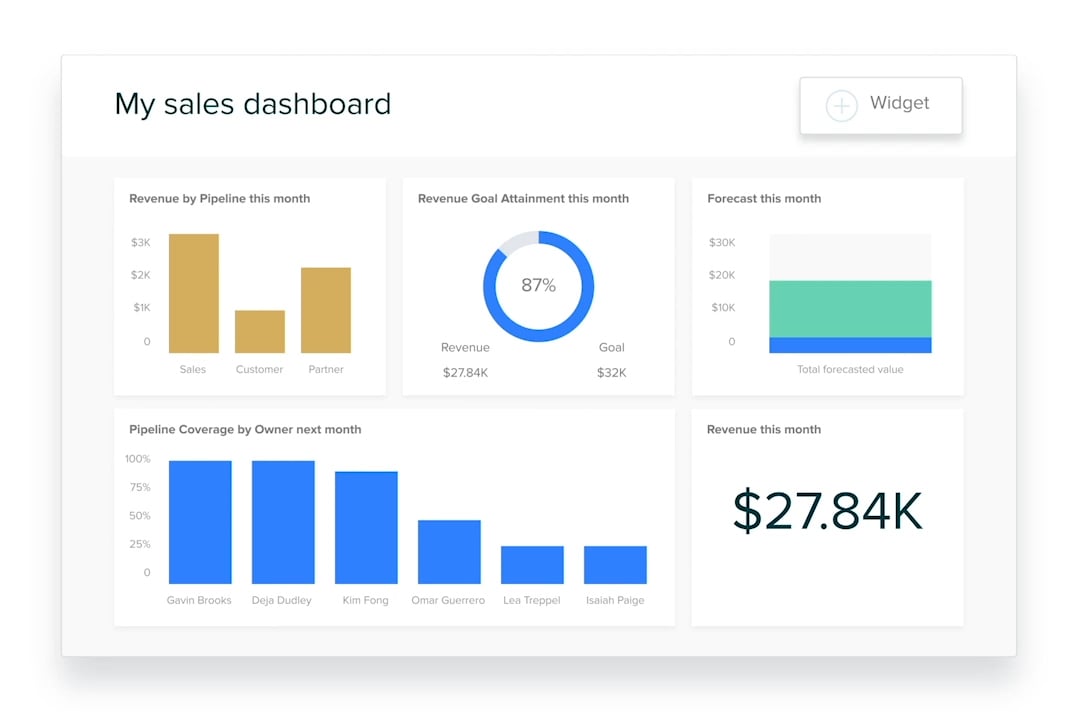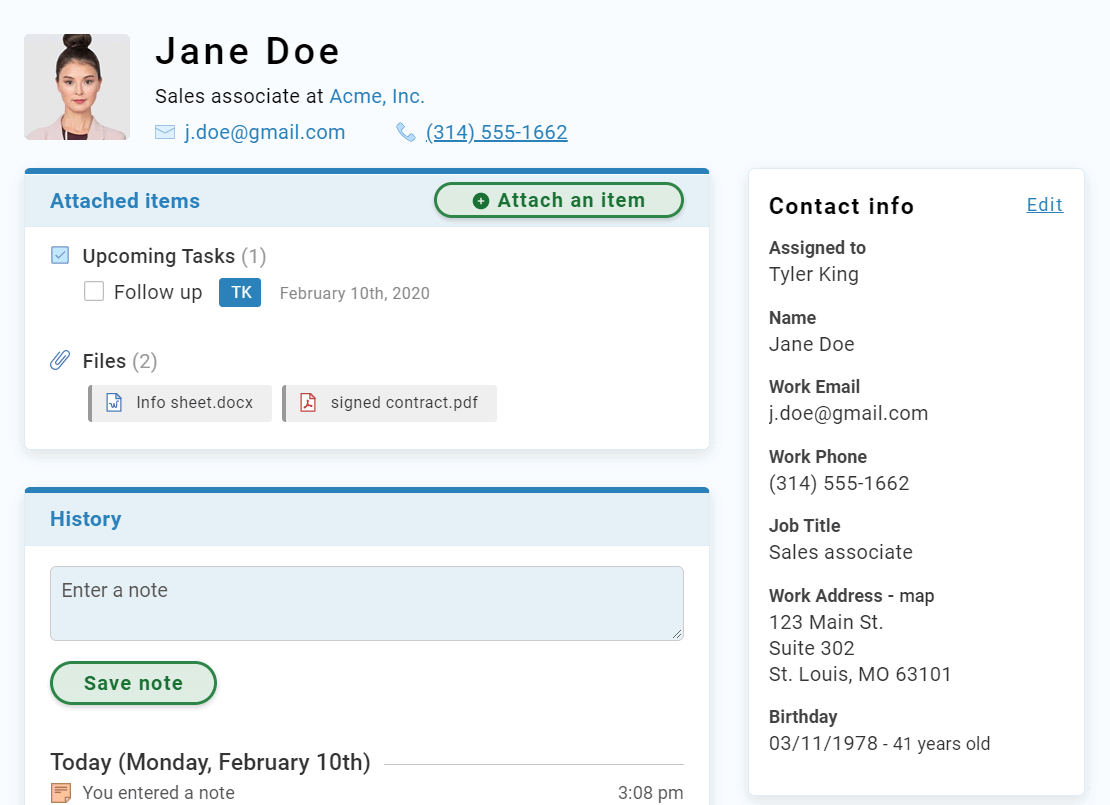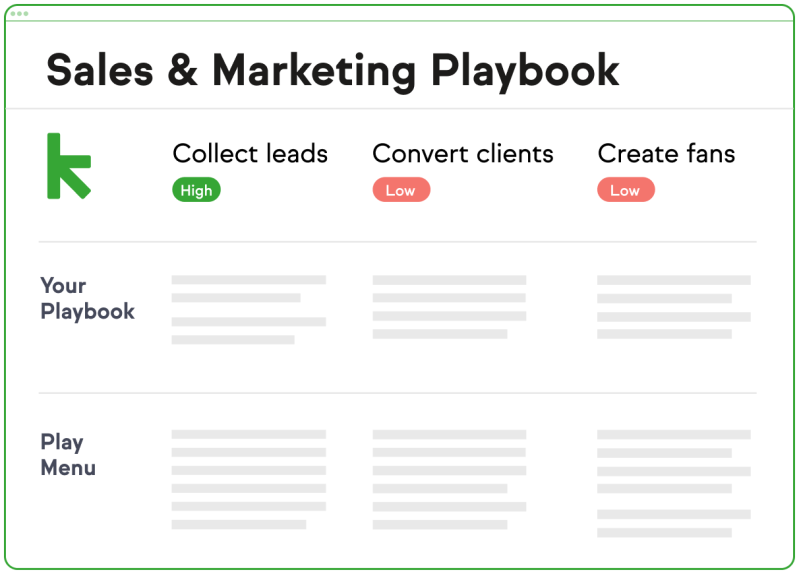Simple CRM - Full Guide on Basic and Easy CRMs
Develop stronger customer relationships with hassle-free and simple CRM software.
A guide to the best simple CRM
Laatst gewijzigd February 24, 2025
No matter what you’re selling, maintaining strong customer relationships is key to a thriving business. In this complete guide, we’ll discuss a simple software platform that lets your salespeople build those strong relationships. All without weighing them down with complex systems. We’ll answer the following questions about customer relationship building, discuss the different types of CRM features, and provide an overview of some of the simplest and best free CRM trials.
- What is a simple CRM?
- How can a basic CRM system help your small business?
- What are the features of an easy CRM?
- 10 easiest-to-use CRM tools
- What should I consider when choosing an simple CRM?
- FAQs
- Try one for free
What is a simple CRM?
If we’re going to keep things simple, we should probably answer the most basic question: CRM stands for customer relationship management. It’s a sales software platform that gives your business the tools you need to build and maintain healthy customer relationships.
CRM software is a huge industry that’s projected to reach more than $80 billion in revenues by 2025. But don’t let that intimidate you. If you’re new to the concept, you should know that there are plenty of simple sales CRM solutions out there to fit your needs. CRM may be a big business, but there are actually a lot of providers who have designed CRM for small businesses.
That’s because the people building CRM software understand that not every business has enterprise-level resources and budgets. And they don’t want to exclude anyone from the big business benefits that come from using this useful digital platform.
That's why some CRM platforms focus on streamlined, easy-to-use interfaces and simplicity. That's what a simple CRM is.
The History of Customer Relationship Management
In the 80s, CRM systems didn’t exist yet. Its predecessor, contact management software (CMS), was created as a digital alternative to bulky and time-consuming rolodexes. As technology improved, CMS features expanded to include a broader range of capabilities. With the advent of automation, companies could save sales reps incredible amounts of time by delegating mundane and repetitive tasks to their computers.
In the early 2000s, the features began to resemble the software platform we know today. As customers gained more access to information about products and services, it evolved to keep up with a better informed population. Today, it’s a powerhouse of features that helps businesses manage their sales pipeline in a constantly evolving market.
How can a basic CRM system help your small business?
Big businesses all over the world are currently using CRM to manage their customer relationships. Apple, Coca-Cola, and Amazon are just a few of the recognizable names who have discovered the enormous benefits of using this type of software to manage their daily workflow. But small businesses have customers, too. And many of them are reaping the same benefits from using CRM as fortune 500 companies.
Just as a home chef doesn’t need a Michelin restaurant kitchen, small businesses don’t need all the features used by big businesses such as Amazon. But that doesn’t mean that the features small businesses need should be any less efficient. Basic CRM systems are designed to fit small businesses and serve their customer base with the same level of care as enterprise-level organizations. The key is to start out simple, and give them room to grow.
Let’s say you’re a small business contemplating using a CRM to manage customer relationships, but you’re worried that it will be too complex to implement. Rest assured that your concerns aren’t going unnoticed. There are platforms out there that can help you build better customer relationships without bogging your team down with complex and confusing systems.
Here are some of the ways a basic CRM system can help your small business:
- You’ll be better organized: If you don’t have a system for organizing your customer data, you risk losing customers to the competition. Customers don’t appreciate having to repeat themselves or provide the same information every time they have to make a purchase or change their order. Having an organized system for being able to store and retrieve customer data lets you act quickly. You can respond to customer needs in a timely manner without making them feel like a first-time customer with every purchase.
- You’ll gain a better understanding of your ideal customer: Understanding what your ideal customer wants is key to tapping into their pain points and providing them with the best solution. It allows you to gather relevant data and insights into customer behavior and preferences. So your sales team can refine and personalize their sales approach.
- You’ll save your sales team from repetitive tasks: Automation features allow small businesses to hand off many of the repetitive and time-consuming tasks that eat away at hours that would be better spent making sales. From building contact lists, to prioritizing leads, to answering basic customer questions. Automation saves you major time so you can make more sales with fewer headaches.
- You can create more personalized marketing campaigns: Using the data compiled in your system, your marketing team can craft personalized messaging that speaks directly to your target market. And with marketing automation and email templates, your reach won’t only become more personalized, it can also expand and bring in more leads.
What are the features of an easy CRM?
Many features are intended for large organizations with enormous client databases. But if you’re a small business, you don’t need all those bells and whistles. Not yet, anyway.
Here are key basic features that every easy CRM platform should have:
-
Contact management
As we learned earlier, contact management was the initial function of CRM’s software predecessor. So it makes sense that it’s on the list of key features. If you’re a small business, you might be storing your contacts in a Google or Excel sheet. And while that will serve you for a while, it could end up slowing you down as your customer base grows.
Contact management lets you store and organize your company’s contacts in a single cloud-based platform. From there, you can record and access important customer details like email, phone number, address, company information. You can also store information about customer preferences, pain points, and history. - Lead management
Lead management software involves several key functions. Lead generation is a marketing process by which your business creates interest in your product or service. See more about lead generation software. This is done through advertisements, blog posts, white papers, social media events, and more. Basically anything your marketing team creates to catch a potential buyer’s eye.
Let’s say someone sees these lead generating materials and is interested enough to offer their phone number, email, or other relevant information. Well, they become a lead. From there, your business continues to gather information about them to see if they truly fit your ICP, or ideal customer profile.
Part of lead management also involves scoring your leads. The higher point value you assign a lead, the more likely that person is to buy. This helps your sales team prioritize the leads they’re going to pursue. The better qualified a lead is, the less work it’s going to take to convert them into customers. - Integration
Nearly everyone uses email to conduct business. It’s an easy way of reaching contacts and sharing documents. Because email is such an integral part to sending and receiving important business-related information, integration is a vital feature of any customer relationship management platform.
Integration connects your email system and other sales apps you’re already using to your CRM. This way, your correspondences with customers are automatically entered into your system, where others from your team can view and use that information. Without integration, you would have to manually enter all of the information in your inbox into your platform, which would be tedious and time-consuming. - Document management
Doing business involves a lot of paperwork. From receipts, to expenses, to tax forms, to contracts, there’s never going to be a shortage of documents floating around your business. Document management is a key feature of any basic CRM platform. It allows your team to upload, store, and organize all the important documents needed to conduct business. Teams can share documents without sending emails back and forth, and quickly request and retrieve information from other people within the company. - Pipeline management
Your sales pipeline is a visualization of your customer’s journey from lead, to prospect, to customer. Pipeline management is the process of managing and organizing your pipeline, so your salespeople are bogged down in cumbersome spreadsheets.
With a simple, well-laid pipeline visualization, your sales reps can clearly see where all of their prospects stand in the buyer’s journey. That helps them know what tasks they need to handle next. It also helps your team monitor their goals. They can make adjustments to their process if they see themselves beginning to fall short of their projections. - Automations
The purpose of automations is to relieve your sales reps of repetitive and mundane work that steals time away from making sales. Even the simplest CRM systems should include some automation features. Automating tasks like data entry, sending follow up emails, scheduling appointments, and creating reports saves your team time and headaches. It also helps you avoid the mistakes that human error can cause when performing mind-numbing tasks. - Reporting & Analytics
The best software will let you know what’s working and what’s not working, so you can continue improving the way you’re using it. When you have access to the hard data on sales figures and team performance metrics, you can begin to see exactly how your team’s activities are working. And where they might need improvement. This is a key feature if you plan on growing your company, and want to continue implementing better practices for improved profits.
10 easiest-to-use CRM tools
-
Zendesk Sell -
Really Simple Systems -
Less Annoying CRM -
Agile CRM -
Salesmate
-
Method:CRM -
Nimble -
Keap -
Copper -
Insightly
1. Zendesk Sell CRM

The makers at Zendesk were so committed to creating a simple, stress-free platform, they even reference its “zenlike” functionality in the name. Zendesk has been on a mission lately to create the most user-friendly, “radically simple” sales CRM platform on the market.
With all the basic features of sales CRM, including contact management and lead management, Zendesk also hosts a clean interface and easy-to-navigate sales dashboard. From here, users can track their pipeline, view their performance metrics, and track their sales goals as your business continues to expand. And with Zendesk’s full suite of business apps, it’s fully scalable with your growth.
Features
- CRM dashboard
- Sales force automation
- Automated power dialer
- Calendar/reminder system
- Marketing automation
- Live chat
- Collaboration tools
- Goal management
2. Really Simple Systems
This simple sales CRM software was designed specifically for B2B sales teams. Its contact management lets users manage their suppliers, contacts, and customer interactions with a 360° view. And you can perform advanced searches across your accounts, opportunities, and tasks to find information quickly.
VoIP telephony allows for incoming call recognition, while Google Maps geolocation lets you locate nearby accounts. And with two-way email integration, users can capture emails and sync unlimited addresses. Additionally, its sales pipeline management feature lets users create invoicing and quotations directly from opportunities to minimize switching browsers.
Features
- Performance metrics
- Customer segmentation
- Campaign personalization
- Dashboard
- Graphical data presentation
3. Less Annoying CRM

This easy-to-use web-based platform allows for instant access to contacts from one screen. Its simple search feature means finding contacts is quickly done. And with its calendar feature, users can build tasks directly into their CRM for easy scheduling. Plus, lead reports give up-to-date information about where your leads stand in your pipeline.
With mobile capabilities, Less Annoying CRM is accessible on mobile devices, so your team can access their sales data from anywhere. Other useful features include email conversation logging, easy importing, daily agenda emails, and free phone and email support.
Features
- Dashboard
- Search/filter
- Lead segmentation
- Influence tracking
- Source tracking
4. Agile CRM

Agile CRM is a sales and marketing platform and project management tool. With its 360 degree contact view, users can build detailed contact profiles. From there, they can view relevant data like social media profiles, interests, points of engagement, and communication history. Agile CRM lets users share information through the cloud with other team members and update contact information in real-time.
Track deals and milestones from Agile CRM’s drag-and-drop sales process. You can easily add opportunities to your pipeline, including essential information such as owner, closing probability, and close date. And with sales force automation features, users are able to trigger automated workflows to ease sales reps’ schedules.
Features
- Auto-responders
- Forecasting
- AB testing
- Contact management
- Lead management
5. Salesmate
Salesmate automates workflows for sales teams, and offers a host of features including built-in caller with auto-dialer, customer journey automation, and email drip sequences. Using its sales activity trackers, receive personalized to-do lists that automatically sync with your calendar, both on your desktop and your mobile devices.
Salesmate’s smart emails feature lets you create and send personalized emails for enriching customer relationships, and then track those emails to analyze performance. And with predefined email templates, sales reps can quickly craft messaging for campaigns that will resonate with their target market.
Features
- Call management
- Campaign management
- Alerts/notifications
- Lead segmentation
- Sales pipeline management
6. Method:CRM
This is a platform designed for QuickBooks users. They have patented QuickBooks sync capabilities and 100% code free customization. That makes Method:CRM a simple CRM software that lets users stay on top of their contact data and customer information. With multiple organizational and opportunity functions, you can keep your daily tasks organized so less time is squandered on manual organization.
Keep your customer information up-to-date and accessible with Method:CRM’s two-way sync function. You can also automate lead collection and invoice creation. Additionally, customers have access to a built-in online customer portal to help your company streamline customer service activities.
Features
- Calendar/reminder system
- Lead generation
- Contact database
- Mobile access
- Performance metrics
7. Nimble

Nimble is a CRM platform that easily integrates with Google Suite and Outlook 365. You can organize your contacts into segmented lists for easy messaging and personalized outreach. And track your team’s activities including calls, tasks, meetings, and events. Nimble keeps everyone on your team on the same page, so managers know where everyone stands in relation to meeting their goals.
Nimble’s sales intelligence lets you target the right companies by helping you find company details like revenue, industry, size, and employee count. Also, with intelligent email tracking, sales reps and marketers can track message opens and clicks. You always have a view of your best prospects.
Features
- Mobile access
- Marketing automation
- Lead segmentation
- Data import/export
- Sales pipeline management
8. Keap

Keap is an all-in-one CRM solution for entrepreneurs, eCommerce, and at-home businesses planning for growth. Some popular features include predictive sending, pre-build reminders, automated follow-ups, and templates. Users can also gather contacts by scanning business cards and converting old spreadsheets.
Keap’s campaign builder lets users visualize their campaigns on a grid map. That’s where they can connect contacts based on triggers and tags you define yourself. You can also segment your customers into groups and send out personalized messaging based on demographics, location, age, and preferred channels of communication.
Features
- Drip campaigns
- Drag & drop
- Campaign management
- Analytics/ROI tracking
- Performance metrics
9. Copper

Copper is a CRM for small businesses that gives users an accurate view of performance. With complete G Suite integration capabilities, Gmail users can directly import information in their emails into their CRM for easy storage and access. Keep all your contacts in one place, including notes, files, and call records. And find information faster by tagging and filtering leads by any criteria you want.
With pipeline management, track opportunities and avoid letting leads slip through the cracks with automated emails and templates. Then, you can sort deals by value amount, and keep track of which deals might be slipping away from you.
Features
- Content delivery
- Campaign management
- Sales pipeline management
- Email marketing
- Performance metrics
10. Insightly

This simple sales CRM platform offers features for lead routing, workflow automation, and email tracking. Keep track of the most important lead information, and automatically send leads to the best possible rep for closing the deal. You can also create complex multi-step processes to simplify your teams’ workflow, and sync with external systems for easy data sharing.
Users also enjoy using Insightly to create custom apps for their businesses, without having to write any code. Create customized dashboards and reports that can be used on mobile devices wherever your team members are, so they can stay on top of their daily workflows and maintain efficiency even when they’re away from the office.
Features
- Lead qualification
- Social media integration
- calendar/reminder system
- Lead generation
- Marketing automation
What should I consider when choosing a basic CRM?
There are a few things to consider before choosing a basic CRM. Before you begin the search, ask yourself some important questions about the state of your company today. And where you’d like to see it in the future.
- What are your current business goals?
- What are the difficulties your teams are currently experiencing when it comes to your customer data?
- What are some of the repetitive tasks taking up your sales reps’ time?
- What are your plans for growth in the future?
- What are your team’s IT capabilities?
- Which features of CRM would be most helpful to your team?
- What is your budget for a new software platform?
Committing to a new software platform can be tricky. Learning to use a new system takes time and patience. There will always be a little hesitation when it seems like the system isn’t working. For this reason, it’s always a smart idea to do a test drive of the platform before signing any contracts. When looking for a CRM for your business, make sure the vendors you’re most interested in have a free version or trial. So you can give it a go before deciding to commit.
Frequently asked questions on simple CRMs
Ready to try a simple CRM system to get started?
If you’re feeling ready to try out a simple sales CRM software, Zendesk is a powerful but user-friendly sales CRM that has all the basic features needed to start your CRM journey. If you think you’re ready to give CRM a try, Zendesk offers a free 14-day trial that lets you test drive their sales tracking software platform and experience simple CRM free of hassle and headaches.
